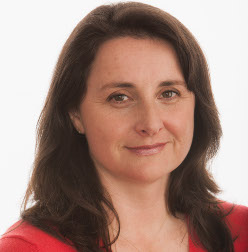SMPTE: Victoria Alonso —Stopping Traffic, Stepping Up, Speaking Out
HOLLYWOOD—As executive producer and executive vice president of Physical Production for Marvel Studios, Victoria Alonso has ascended the Hollywood studio hierarchy, a feat of both determination and imagination.

As a young girl growing up in Argentina under a military dictatorship, Alonso said, “the only expectation was to get out alive. To get to school and see my mother and my sister at the end of the day.”
She did, however, have a window on the movie world. Alonso said her fascination with the Oscars drew her to Hollywood, and a boulevard she found considerably seedier than what she expected.
“It’s like the Ritz now,” she said at the Women in Technology Luncheon, held Monday in conjunction with the 2016 SMPTE Technical Conference. Alonso, the featured speaker, was joined by interviewer Kari Grubin, vice president of mastering for The Walt Disney Co., and 100 attendees—a record number for the annual event.
Alonso, who ran Marvel’s visual effects shop before being promoted to physical production chief in September of 2015, has a substantial catalog of blockbusters under her belt, including “Captain America: Civil War,” “2015’s Avengers: Age of Ultron,” “Ant-Man,” “Guardians of the Galaxy,” “Captain America: The Winter Soldier,” “Thor: The Dark World” and “Iron Man 3.”
She is currently executive producing several upcoming Marvel features, including “Doctor Strange,” “Avengers: Infinity War,” “Thor: Ragnarok” and “Guardians of the Galaxy 2.” Her other credits include Ridley Scott’s “Kingdom of Heaven,” Tim Burton’s “Big Fish” and “Iron Man.”
“I don’t now where you think I am, but it’s probably more glamorous from the outside than the inside,” she said. She’s seen most of the major studios at “odd times of day,” she said.
Alonso launched her questionably glamorous career stopping traffic. Literally. She was given a radio and told to “block traffic.” She later became a production assistant whose obsession with detail led to slicing jalapenos with a razor, which so impressed her boss Tony Scott that he called on the “Jalapeno Girl” to take delivery of his new Ducati at his Malibu movie colony home.
Scott’s Jalapeno Girl described a career path based on authenticity of self, curiosity and taking action. One mistake she said she made at a “major studio” was acting on her ego. She said what she thought was expected of her, thinking it would provide job security.
“I wanted to be me,” she said. “Me without my voice is an empty vessel.”
As if on cue during her presentation, Alonso’s voice was nearly drowned out by the sound of helicopters bringing President Obama to Jimmy Kimmel’s studio nearby. Unperturbed, Alonso continued.
“Your voice is your biggest tool,” she said. “Figure out that sometimes, by saying nothing, you say a great deal. When I get quiet, the team fears the worst… It’s a balance of when to use it, why to use it, and how to use it.”
“At times when I offered my two cents, mostly I was shut down and tried to carry on,” she said.
“A thousand times a day at Marvel—even today after almost 12 years—I give ideas. Nine-hundred-ninety-eight don’t even get listened to. Two are listened to. One ends up on the cutting room floor. The other is debatable all the way through.
“You have to try. You have to put yourself out there. If it’s that hard for you, you shouldn’t be in this business,” she said. Alonso said she had no problem putting herself out there. Humility is more of a challenge, she said.
“I’m from Argentina,” she said. “Humble is hard.” She learned the importance of humility from her mother, who taught at a university. She said her mother would address everyone by name, including the cleaning lady, Maria. “She said, ‘it doesn’t matter who you are, if you get locked out of the university, Maria is the only one who has the keys,’” Alonso said.
She said humility was a “core value you don’t get to have in Hollywood. Being in Hollywood is all about getting to the top and being a ‘name’—which is weird—it’s like crawling up a ladder.”
Alonso was asked about competitiveness among and between women. There were women that were “incredibly supportive,” she said, but two of a dozen were “really competitive.” It’s one thing to have to convince the men, she said, but there’s always that feeling of competition with perhaps that one other woman.”
“Sometimes women need to learn to take each other and hold each other as we’re going up…. There’s only so much you can do to break the glass ceiling if no one’s following you,” she said.
Alonso urged everyone to make three phone calls—one for someone you know who needs your help; another for someone you don’t necessarily want to help and the other—for yourself.
Get the TV Tech Newsletter
The professional video industry's #1 source for news, trends and product and tech information. Sign up below.
